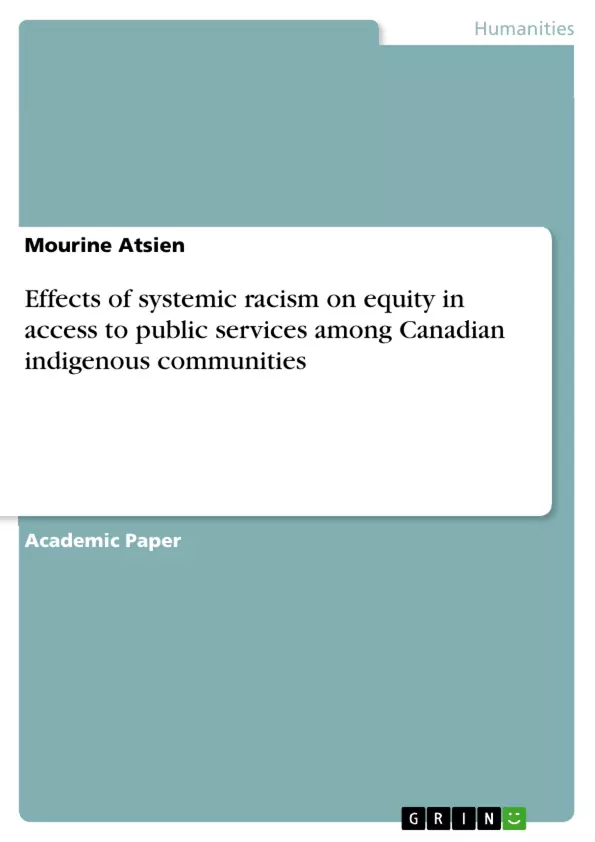Canada enjoys a positive global standing as a human rights defender. As a demographically and culturally diverse society, it has an enviable record in terms of core civil and political rights. The Canadian Charter of Rights and Freedoms guarantees these rights (OECD, 2022). Whereas considerable efforts have been made in Canada in advancement of human rights, concerns remain on the country’s relationship with the indigenous communities. These communities lag behind in access to public services such as healthcare, and higher education. They have one of the worst unemployment rates among the minority groups. Brooks (2017) indicated that systemic racism could be possible contributor to injustice and inequalities that the indigenous communities suffer. Though Canada continues to implement various efforts to address systemic racism and other wide-ranging violations against the indigenous people, Heatherton (n.d.) suggested there is still a long way to go in achieving equality in access to public services by all Canadians. In line with this argument, this essay explores how systemic racism continues to adversely impact on the indigenous people’s access to public services in Canada.
Inhaltsverzeichnis (Table of Contents)
- Introduction
- Discussion
- Systemic Racism
- The Indian Act
- Systemic Racism and Public Services
- The Indian Act and Indigenous Rights
- Abolishing the Indian Act
- Systemic Racism and Land Rights
Zielsetzung und Themenschwerpunkte (Objectives and Key Themes)
This essay explores the impact of systemic racism on the access of Indigenous people to public services in Canada. It examines historical and ongoing inequalities, focusing on the role of the Indian Act and its consequences.
- Systemic racism within Canadian society
- The impact of colonial policies on Indigenous communities
- The role of the Indian Act in shaping Indigenous lives and rights
- Inequalities in access to public services for Indigenous populations
- The ongoing debate surrounding the Indian Act and its potential abolition
Zusammenfassung der Kapitel (Chapter Summaries)
The essay begins by defining systemic racism and outlining its historical roots in Canada. It then delves into the Indian Act, exploring its origins, provisions, and impact on Indigenous cultures and societies. The essay further examines how systemic racism manifests in the provision of public services, highlighting the inequalities faced by Indigenous communities in accessing healthcare, education, and other essential services. Finally, it explores the ongoing debate surrounding the Indian Act, examining the arguments for and against its abolition, and the complexities involved in navigating this issue.
Schlüsselwörter (Keywords)
Systemic racism, Indigenous rights, Indian Act, access to public services, colonial policies, treaty rights, self-governance, social inequalities, land rights, Indigenous communities, Canadian history.
Frequently Asked Questions
How does systemic racism affect Indigenous communities in Canada?
Systemic racism contributes to significant inequalities, leading to Indigenous communities lagging behind in access to essential public services like healthcare, higher education, and employment.
What is the significance of the Indian Act in this context?
The Indian Act is a colonial policy that has historically shaped Indigenous lives and rights, often reinforcing social inequalities and restricting self-governance.
What are the main barriers to public services for Indigenous people?
Barriers include historical roots of racism within Canadian institutions, colonial policies that created systemic disadvantages, and ongoing challenges in achieving equity in service delivery.
What is the debate regarding the abolition of the Indian Act?
The debate involves complex arguments about whether abolishing the Act would empower Indigenous communities through self-governance or if it would pose risks to existing treaty rights and land claims.
How does the Canadian Charter of Rights and Freedoms relate to this issue?
While the Charter guarantees core civil and political rights, there remains a gap between these legal protections and the actual lived experiences of Indigenous people regarding equality and access to services.
- Quote paper
- Mourine Atsien (Author), 2022, Effects of systemic racism on equity in access to public services among Canadian indigenous communities, Munich, GRIN Verlag, https://www.grin.com/document/1326040



